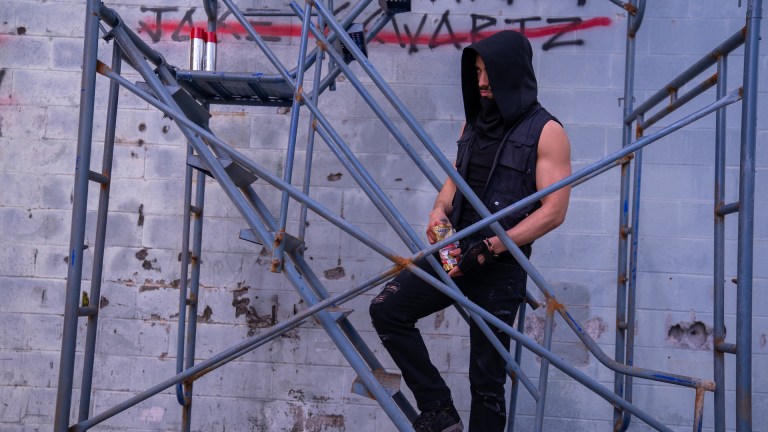DMZ: What’s Behind the Show’s “Eyes Forward Love” Message?
Roberto Patino, showrunner of HBO Max’s DC Comics adaptation DMZ, says the series about a second American Civil War is more optimistic than you might think.

This article contains spoilers for DMZ episode 1.
There’s never really an ideal time to premiere a TV show about war.
Invariably, someone somewhere on the globe is experiencing the brutal destruction of armed combat at any given moment, making a fictionalized depiction of it a dicey proposition for any storyteller. This is a lesson that HBO Max limited series DMZ understands quite intimately.
The DC comic upon which HBO Max’s series is based was first released in 2005 and served as a commentary on its era’s wars in the Middle East. The comic’s storyline, which imagined a second American civil war turning Manhattan into a desolate demilitarized zone between two warring factions, could have just as easily been set in Baghdad, Iraq or Kabul, Afghanistan. It was a way to present to the Western world that their worst case post-apocalyptic scenario was someone else’s unavoidable present.
Now, more than 15 years later after the comic’s premiere, all four episodes of DMZ have arrived to HBO Max amid omnipresent news coverage of another war – perhaps the most consequential one in Europe since World War II.
“It keeps me up at night. It’s so fucking horrible,” DMZ showrunner Roberto Patino says of Russia’s invasion of Ukraine.
Just as its comic version once was, DMZ the TV series is again tragically timely. Which is why it’s important to its showrunner to clarify that the story at play here is something more timeless and elemental.
“A war has been going on someplace in this world since both you and I have been alive,” Patino says. “The angle that we took in this show is to completely cut through the politicizing of ideas to get to the real core of nation building. We finished the pilot in 2020. That was pre-George Floyd, pre-COVID. The world has only continued to turn itself inside out. I have no interest in glorifying war. If anything, this is about what war does to communities and how people rise above.”
Patino, who previously worked as a writer on shows like Sons of Anarchy and Westworld, was an early adopter of the DMZ comic. The Harvard graduate was taken by Brian Wood and Riccardo Burchielli’s chilling depiction of a “war in our own backyard.” When Patino returned to the story 10 years later, however, he did so with a new, somewhat unexpected perspective.
“I came back to it and the world was a totally different place. That concept struck a totally different cord. For this comic that is so predicated on its time and place, it paints such a harrowing world and narrative. I saw an opportunity in that to shape this into a hopeful story.”
That’s right. Amid all the sectarian violence, broken families, and post-apocalyptic imagery, the world of HBO Max’s DMZ is ultimately a hopeful one. Because honestly: how could it get any worse?
“It represents the worst case scenario,” Patino says. “And how cool to assume that and then show the story of humanity transcending and surmounting that?”
While the comic series begins by focusing on journalist Matty Roth documenting the various crises in the Manhattan DMZ between the Free Armies and the United States, the TV series opts for a more personal touch. Rosario Dawson stars as relatively minor comic character Alma “Zee” Ortega in an expanded role. Alma is a medic who decides to brave the DMZ’s various anarchic districts to find her missing son. Benjamin Bratt meanwhile stars as Parco Delgado, leader of the Upper West Side-controlling Harlem Kings and Alma’s ex.
Equally as crucial to DMZ’s success as its cast is the DMZ itself. Production opted to film in Atlanta to create imagery of a war-torn Manhattan as shooting on location on the real island would be logistically impossible. Still, The Big Peach does an excellent job standing in for many of The Big Apple’s iconic locations.
“Central Park is a great example,” Patino says. “That was shot in a shut-down prison’s parking lot that had been overgrown. We knew which way was North and we knew which way was South so we knew how to add in buildings as necessary. The people in Atlanta are great. Before they say ‘no’ they say ‘yes and how can we do this safely?’”
Part of that Atlanta set eventually plays home to one of DMZ’s most intriguing moments. At the end of episode 1, after Alma discovers that an ascendant DMZ warlord is actually her son, she makes a bold move by defacing some important graffiti. Over a very public hit list scrawled by the Harlem Kings on a building’s side, Alama writes in bold white text “EYES FORWARD LOVE”.
The enigmatic phrase doesn’t come from the comic source material but rather three separate bits of Patino’s literary inspiration for the series: CJ Chivers’ The Fighters, Michael Herr’s Dispatches, and even Ernest Hemingway’s A Farewell to Arms.
“There’s an awesome set piece (in Farewell to Arms) where they’re looking for (Lieutenant Henry) after he sneaks out with his love,” Patino says. “The two of them are in this boat and they’re rowing and he talks about vectoring forward. You gotta keep vectoring forward. He’s talking about how ripped up his hands are. This woman he loves is pregnant. It’s raining. It’s hellacious but his whole refrain is ‘keep going forward.’”
Considering the state of DMZ’s world (and at times our own), forward is never a bad direction to vector toward.
All four episodes of DMZ are available to stream on HBO Max now.
